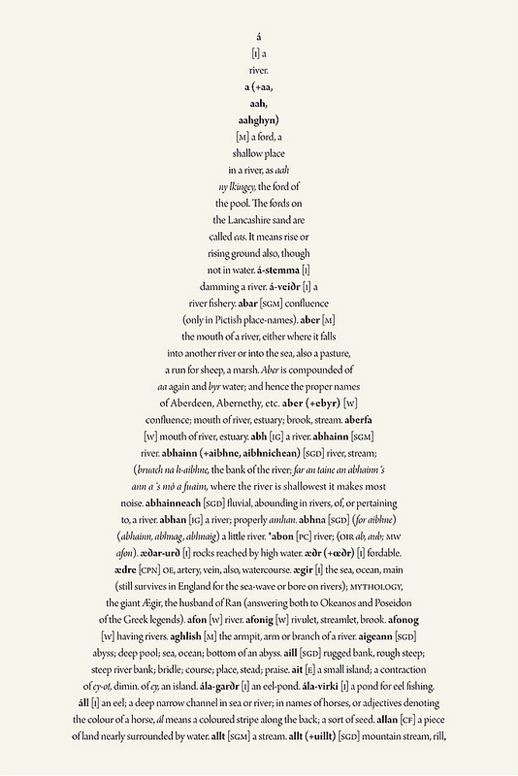Dear Jeff
I wonder if you can help me with a new project relating to my Limnology book?
The book contains a glossary of words about rivers in Icelandic, Irish, Gaelic, Manx, Welsh and Anglo-Saxon, and I’d like to record speakers of each language reciting the words from the list that are pertinent to them. My idea is to collate them into a new sound piece for installation, initially at a gallery in Manchester.
Here’s some info on the new project
The Limnology book itself is about rivers, lakes and other inland waterways. It mainly comprises a poetic exploration of “water words” found in some of the various languages that have historically commingled with English.
My interest in words that relate to the landscape began about ten years ago, when I revisited a region near my birthplace known as Anglezarke, on the West Pennine Moors of northern England. Over the ensuing years I became fascinated by many of the surrounding place-names. Anglezarke, I discovered, means “Anlaf’s erg” – a shieling or hill pasture belonging to the Scandinavian Anlaf. Apparently “erg” is a Gaelic loan-word, so Anlaf may have spent time in Scotland, Ireland or the Isle of Man, before coming to Lancashire. I found this web of interlinked, multi-lingual connections incredibly beguiling, and it has fuelled much of my creative output over the last half decade.
My fascination with rivers, and water words, began with the River Yarrow, which is birthed on the moor’s southern edge. A number of my early musical recordings took the Yarrow as its source, including: “Undertow” (2005), “What the River Said” (2006), “Brook” (2008), “Ford” (2008), “The River” (2009), “Artery” (2009), “Threads Across the River” (2009), “Undertow” (2009), “River Song” (2009), “From Which the River Rises” (2010), and now, “Limnology” (2012).
In 2011, my wife Autumn and I relocated to a small, steep-sided valley in south-west Cumbria. Water, in its many forms (rain, mist, ice, snow, river, waterfall, pond, bog), is a dominant feature of the landscape, and a book/recording about water soon suggested itself. I therefore began researching words in the local dialect, and discovered many, such as “latch” – an occasional watercourse (ie: a stream formed after heavy rain); “curl” – the ripple on water caused by a slight wind, and “lum” – a deep pool in the bed of a river. To borrow a riverine analogy, it seemed to me that the English language had become sluggish where once it had been quick; that it had deposited, over the centuries, much of its precious cargo of words that related to the natural environment – and that some of these sediments could be dredged from old books.
Furthermore, by following the etymologies found in glossaries and dictionaries, I discovered that many of the dialect words had their origins or cognates in other languages, including: Old Norse, Gaelic, Irish, Manx, Welsh and Anglo-Saxon, and so I began to assemble a list of water-words from those languages too. Over the course of a year, I accumulated over 1000 words and phrases relating to rivers, lakes and inland waterways, and compiled them into a glossary which forms the latter section of Limnology.
Given that much of the beauty of words is in their sound – their music – I would love this word-hoard to come alive; for it to be read aloud by as many people as possible – especially as many of these words may not have been uttered for decades (and in some cases, centuries). I would therefore like to put the call out to anyone who is interested in lending their voice to create a new recording – a multi-lingual “river of words”.
Anyone interested can contact me via Facebook or
email corbelstonepress@yahoo.co.uk.
You can find Simon Scott’s review of Limnology in the Caught by the River archives here.
